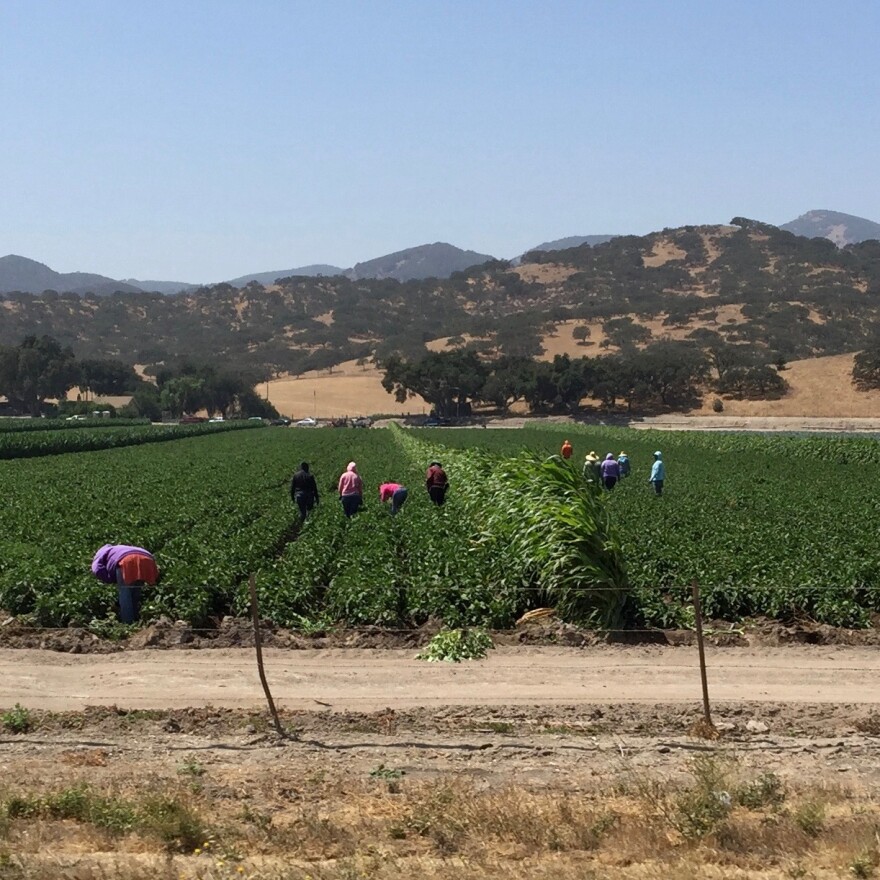Some people vote in hopes of making their voices heard. Others are ineligible to vote, because of age, citizenship and other reasons. But there are ways non-voters can participate in the political process, from activism to protesting to community organizing. With that in mind, several organizations in Santa Barbara County helping people engage civically — especially Latino and Indigenous youth.
At a recent meeting, the Santa Barbara County Board of Supervisors held a forum on the collaboration between local law enforcement and U.S. Immigration and Customs Enforcement, or ICE. It’s part of the Truth Act, which requires law enforcement to inform immigrants if they will be handed over to ICE for deportation, and requires counties to hold annual forums with public comment.
During this year’s public comment, people from all over the county spoke — including Francisca Camarillo, an undocumented resident of Santa Maria.
“When a parent is separated due to ICE, they don't know if they will be able to see their children again. Who will take care of them when they are gone?” Camarillo said.
She urged the Board and Sheriff’s Office to adopt a policy to end all law cooperation with ICE. The labor of undocumented people is essential to feed the city, the state, the nation, and the world, but that their humanity isn’t always valued, Camarillo said.
“They have to live perfectly and not commit any crime, cross a red light, or even jaywalk,” she said, noting that communities of undocumented people have lower crime rates than those made up of U.S. citizens, a claim supported by the U.S. Department of Justice.
After the board meeting, Camarillo said it was stressful to speak publicly like this. She has DACA status, meaning she isn’t at risk of deportation, but she still gets anxious around law enforcement — like many in her community.
“That’s why it was very scary to come here. It's a very new space for me,” she said.
It was challenging for my family to be civically engaged, to keep up with local, state and national politics. And that's really because my parents worked from sunrise to sunset as field workers.Santa Maria City Councilmember Gloria Soto
Speaking up at public meetings may be fraught for undocumented people like Camarillo, but it’s one of the main ways they can participate in the political process. Without being able to vote, it’s things like community organizing and activism that allows them to make their voices heard.
One North Santa Barbara County organization helping people like Camarillo become more civically engaged is Future Leaders of America. The organization formed in 1982 to train young at-risk Latinos for personal and political leadership.
Santa Maria City Councilmember Gloria Soto started volunteering with FLA as a teenager, and became executive director in 2021. She said the organization was essential in growing her own civic engagement.
“I became the youngest woman ever elected to the City Council, and I won my reelection campaign this last November. I'm very, very grateful to Future Leaders for those early teachings,” Soto said.
Soto said she wants to continue to spark that same leadership journey in other young folks. She grew up in a mixed-documentation status family, and her parents worked in Santa Maria-area farms. She said that showed her the barriers facing many undocumented Latino residents in the area.
“At least in my own experience,” Soto said, “it was challenging for my family to be civically engaged, to keep up with local, state and national politics. And that's really because my parents worked from sunrise to sunset as field workers.”
Yet, Soto said seeing the children of immigrants— like herself —becoming more politically engaged is in large part due to organizations like Future Leaders of America. She said it’s important to mobilize people to engage in the political process, whether they’re able to vote or not.

“They are taxpayers as well. Their voices or their concerns need to be heard and deserve to be addressed,” Soto said.
Francisca Camarillo is a good example. She’s now a youth program coordinator for the Mixteco / Indigenous Community Organizing Project, also known as MICOP. During public comment, she told the supervisors that she works with youth who are afraid their parents will be deported.
And it’s not just that fear keeping people from speaking out. At the supervisor meeting, an interpreter was present who translated Spanish to English. Yet, as Camarillo said, she’s an indigenous person who speaks English…
“...for somebody who speaks Mixteco, it's almost impossible for them to be here,” she said.
It seems that overcoming language barriers and fear of law enforcement has made a difference in one key way. According to its records, in 2019, the Santa Barbara Sheriff Department transferred 38 individuals to ICE, and by 2021, the number was down to 2. The political engagement of Latinos and indigenous groups, at least at these forums, appears to be making an impact in Santa Barbara County.
Coming up next week in this series, we’ll hear about another group of people in the county who are getting engaged in politics and government: students. That’s next time on Polling the People.
Polling the People is made possible by a grant from the Sunflower Foundation.






